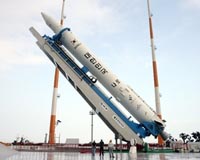 |
Seoul (AFP) Aug 25, 2009 South Korea's first space rocket blasted off Tuesday in a long-delayed launch but failed to place a satellite into its designated orbit, officials said. In an event watched guardedly by rival North Korea, the Korea Space Launch Vehicle-1 lifted off on schedule at 5:00 pm (0800 GMT) atop a tail of flame, to the jubilation of officials at the Naro Space Centre. The first stage separated successfully less than five minutes after lift-off and the South Korean-built 100-kilogram (220-pound) scientific research satellite was placed into Earth orbit. But science and technology minister Ahn Byong-Man said it was not following the designated orbit, hampering communications with mission control. "All aspects of the launch were normal, but the satellite exceeded its planned orbit and reached an altitude of 360 kilometres (225 miles)," Ahn said. It should have separated at around 302km. "A joint probe is under way by South Korean and Russian engineers to find the exact cause," the minister said. Experts from the Korea Aerospace Research Institute told Yonhap news agency they were trying to track the whereabouts of the satellite and declined to say if contact could be made later. They said that despite the satellite's failure to reach its proper orbit, the launch should be seen as a "half success" since the rocket functioned without any problem. "The rocket was successfully launched. I congratulate our people," Prime Minister Han Seung-Soo said earlier from the launch site at Goheung on the south coast. North Korea, which is smarting over UN Security Council censure of its own rocket launch in April, had vowed to closely monitor the launch. Pyongyang insists it was unfairly punished for its April 5 launch, saying it merely put a peaceful communications satellite into orbit. It wants Seoul's launch also to be referred to the Security Council. Washington and its allies have said no North Korean satellite was detected in orbit and its launch was a disguised test of a Taepodong-2 missile. Seoul has bristled at any comparisons with its neighbour's operation, insisting its own project is purely scientific. The US State Department said last week that South Korea -- in contrast to the North -- had developed its programme transparently and in keeping with international agreements. The launch of Seoul's rocket, built and operated in partnership with Russia, follows seven delays since 2005. Last week a software problem halted the countdown with just eight minutes to go. South Korea, an international economic powerhouse, entered Asia's space race relatively late. It has invested 502.5 billion won (419 million dollars) and much national pride in the 33-metre (108-foot) rocket, whose first stage was built in Russia and the second stage by local engineers. South Korea has previously sent 10 satellites into space using launch vehicles from other countries. In November 2007 it announced a plan to launch a lunar orbiter by 2020 and to send a probe to the moon five years after that. South Korea unveiled the lunar project one month after China launched its first lunar orbiter and two months after Japan did the same. In April last year Seoul sent its first astronaut into space aboard a Russian Soyuz rocket. Share This Article With Planet Earth
Related Links Rocket Science News at Space-Travel.Com
 SKorea bids again for first rocket launch
SKorea bids again for first rocket launchSeoul (AFP) Aug 25, 2009 South Korea was preparing to launch its first space rocket later Tuesday, six days after a software glitch halted the countdown just eight minutes before blast-off. The project to put a South Korean satellite into orbit, operated in partnership with Russia, has been delayed seven times in recent years. "We've fixed the computer software problem and overhauled all other software. We hope ... read more |
|
| The content herein, unless otherwise known to be public domain, are Copyright 1995-2009 - SpaceDaily. AFP and UPI Wire Stories are copyright Agence France-Presse and United Press International. ESA Portal Reports are copyright European Space Agency. All NASA sourced material is public domain. Additional copyrights may apply in whole or part to other bona fide parties. Advertising does not imply endorsement,agreement or approval of any opinions, statements or information provided by SpaceDaily on any Web page published or hosted by SpaceDaily. Privacy Statement |